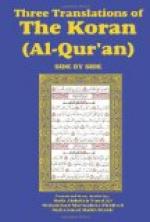13 An allusion to the word Rabbi, used by Jews and Christians, of their priests, etc., but in Arabic of God only. Comp. Matt. xxiii. 7, 8.
14 See Sur. [cxiv.] v. 85.
15 The intercalation of a month every third year, in order to reduce the lunar to the solar years, is justified by the Muhammadans from this passage.
16 See Sur. xiii. 26, p. 336 (n.).
17 With Abubekr. lit. second of two.
18 Wahk. reich oder arm. Savary, young or old. Ibn Hisam (924) pronounces this to be the oldest verse of the Sura.
19 This refers to the expedition of Tabouk, a town half-way between Medina and Damascus, against the Greeks, A.H. 9. Muhammad was now at the head of an army of 30,000 men. Verses 42-48 are said to have been revealed during the march.
20 Lit. prepared a preparation.
21 Lit. written.
22 That is, victory or martyrdom.
23 Compare Sura iii. 172. Geiger, p. 76, shews that this is precisely the teaching of the Talmudists with regard to the wicked.
24 The poor, i.e. absolute paupers; the needy i.e. those in some temporary distress.
25 The petty Arab chiefs with whom Muhammad made terms after the battle of Honein, in order to secure their followers.
26 There seems to be a play, in the original, upon the similarity of the words for injure and ear.
27 Lit. (are) the one from the other.
28 From giving alms.
29 Comp. Sura liv. 15, p. 77. The traditions as to the collection of pitch from wood of the Ark, in the time of Berosus (B.C. 250?) for amulets, and of the wood itself, in the time of Josephus (Ant. i. 3, 6, c. Apion, i. 19) must have reached Muhammad through his Jewish informants. Fragments are said to have existed in the days of Benjamin of Tudela, and to have been carried away by the Chalif Omar, from the mountain al Djoudi to the mosque of Gazyrat Ibn Omar.
30 To kill Muhammad. The circumstances are given in a tradition preserved ap. Weil, p. 265, note. The meaning is, that the people of Medina, who had become enriched by Muhammad’s residence among them, had no better motive for disapproving the attempt upon his life. Lit. they had nothing to avenge but that, etc.
31 Prayers for the dead were customary among the Arabians before Muhammad. See Freyt. Einl. p. 221.
32 The Mohadiers were those who fled with Muhammad from Mecca to Medina, the Ansars his auxiliaries in Medina.
33 The commentators are not agreed as to the nature of this double punishment.
34 The fine of a third part of all their substance was imposed upon seven of those who had held back from the expedition to Tabouk. This is the fault spoken of in the preceding verse.
35 The tribe of Beni Ganim had built a mosque, professedly from religious motives, which they invited Muhammad on his way to Tabouk to dedicate by a solemn act of prayer. Muhammad, however, discovered that the real motive of the Beni Ganim was jealousy of the tribe of Beni Amru Ibn Auf, and of the mosque at Kuba, and that there existed and understanding between them and his enemy the monk Abu Amir, who was then in Syria, for the purpose of urging the Greeks to attack the Muslims and their mosque. It is to him that the word irsâdan refers.




